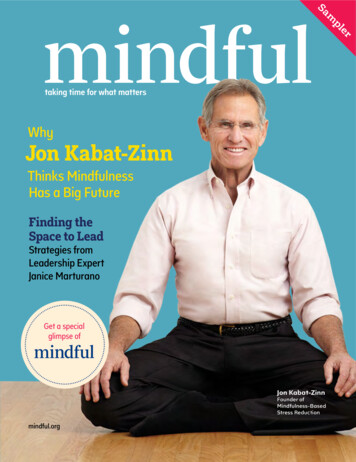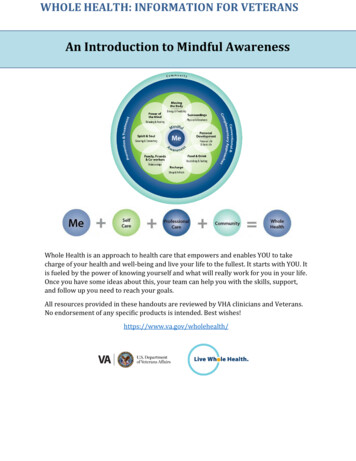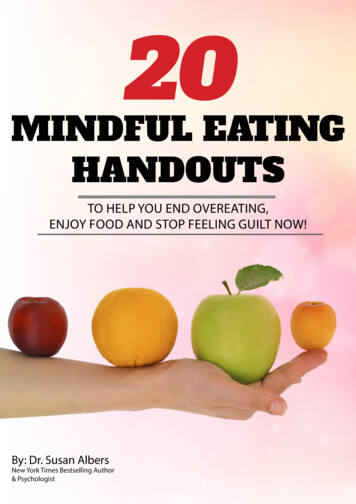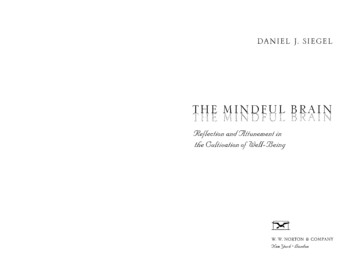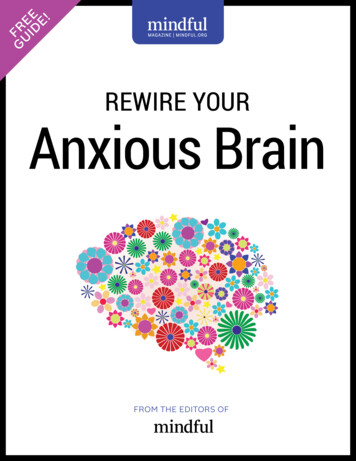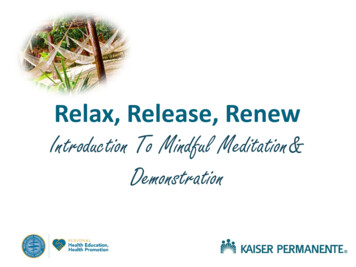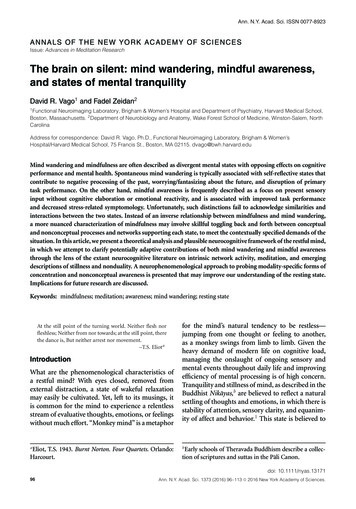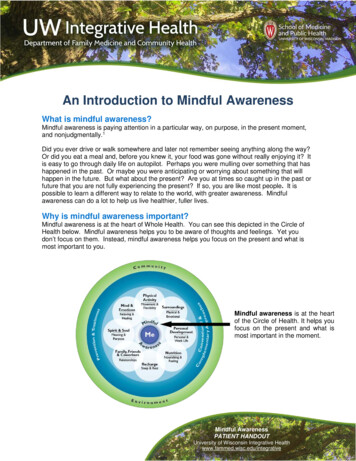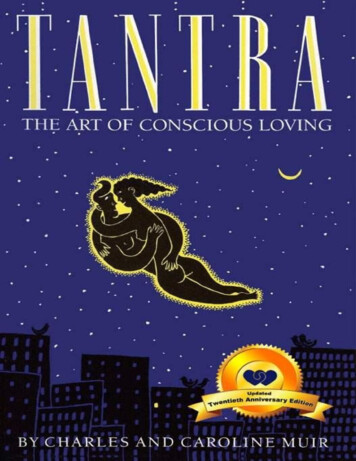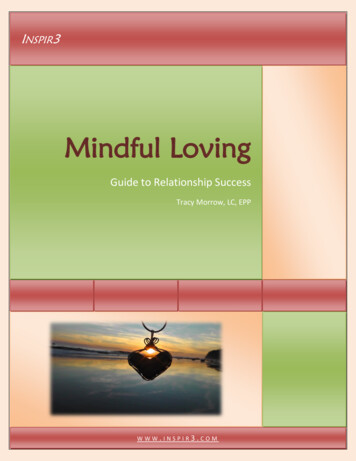
Transcription
INSPIR3Mindful LovingGuide to Relationship SuccessTracy Morrow, LC, EPPWWW.INSPIR3.COM
Mindful LovingContentsIntroduction .3What is Mindfulness? .4Benefits of Mindfulness .5Mindfulness with Your Partner .5It Starts with YOU .7Mindful Loving Skills .8Mindful Understanding and Validation.9Mindful Meeting of Needs . 11Mindful Trust and Respect . 12Mindful Playfulness and Passion . 13Mindful Courage and Honesty . 13Mindful Alignment . 14Mindful Loving Tips for Practicing . 15Mindful Resources . 162
Mindful LovingIntroductionMindful Loving is effective for all of yourmost important relationships. I’ve writtenthe Mindful Loving guide to focus onromantic relationships, but most of thetopics can be easily applied to other familymembers, coworkers, neighbors, friendsand anyone else you come in contactwith. The skills learned will help yougrow, heal, improve and deepen anyrelationship you decide to apply them to,including your relationship to you. In factthe more you practice these techniques in all your relationships, the stronger they willbecome to enhance your primary relationships.I’m sure you’ve realized by now that many relationships come and go. Some of themneed to go. They might be abusive, toxic or filled with dysfunction that one or bothpartners are unwilling to get help for. While it can be sad to let go of those relationships,preserving your own health and future happiness sometimes demands that.Unfortunately many great relationships get thrown out too because of historically lowrelationship literacy rates and issues due to past relationships, especially from ourchildhood. The reason I wrote the Mindful Loving guide is to help you overcome slightto extreme relationship issues by using Mindful Loving skills. It will help you createastoundingly deep and nourishing relationships.How do you know if a relationship is worth improving or saving?If you have made a commitment together such as marriage or living togetherIf you have children togetherIf there is no abuseIf there are no ACTIVE addictions and a person that is an alcoholic/addict ispursuing ongoing recovery to sustain a healthy, functional lifestyleIf you both agree on the most important things in life, an example would behaving similar morals and valuesIf you have decided that your relationship is worth fighting for, beginning to practice thefollowing Mindful Loving practices will create some immediate and ongoingimprovements. They will be most effective if you and your partner both agree to practice3
Mindful Lovingtogether, but even if only one of you begins, there will be a marked improvementbecause when one of you in a partnership changes, the other person has no choice butadjust to those changes. While some changes may be met with an initial negativereaction, mostly due to attachment to what is familiar, sticking with them will providepositive outcomes.These Mindful Loving practices are so strong that the world’s leading relationship coachesand counselors also use them when working with clients. You can start them on yourown, or decide to enlist the help of an Inspir3 coach to keep you both accountable asyou create new habits with each other.The Mindful Loving Guide is a gift to you and your relationship, because the world needsmore stable unions and healthier ways of celebrating those most special bonds. If at anytime in the guide you have any questions, please contact me at tracy@inspir3.com for afree coaching session to help figure it out.What is Mindfulness?Mindfulness is most easily explained asBeing Present, in this moment, with anonjudgmental,purposefulawareness.Maintaining that awareness means that youare paying attention with intention tosimply observe what is going on aroundyou. A great example would be to thinkabout food.You can be aware that you are eating, butbeing mindful to what you are eating goes afew steps deeper, it means paying attentionto the food, how it looks, smells, tastes, what its textures feels like, what your mouthfeels like as you are chewing and how it feels when you swallow. It also means that youare aware when your mind takes you away from being present with your food and togently bring your attention back to the experience of eating. Most people are not sopresent while they eat. Instead they eat and read their emails, surf the web, watchtelevision or any other distraction.When you are mindful, you are not in your head thinking about the past or future. Nowwhat is confusing to most people is that the brain goes on and on and is impossible to4
Mindful Lovingquiet down, it will always distract you. But, that is the brains job to do so and stopping itis like trying to stop your heart from beating, so don’t bother. Just return yourself to thepresent moment. Become aware of when your mind wanders and just let it go as youbring the rest of your senses into the immediate life experience. Your mind willeventually get the idea and become calmer, clearer and will not bother you quite asmuch as it will when you first make attempts to live without becoming attached to itsconstant chatter.This way of living, mindfully, is not normal in the sense that most people are not able tomaintain a mindful state of being for very long. That is why mindfulness is a practice. Itcan be strengthened through yoga, meditation, or other methods such as listening, feelingand observing exercises. The benefits are endless though and will not only improve yourrelationship with your partner, but with all of life.Mindful Loving brings a different element into a mindfulness practice in order tospecifically strengthen and enhance your relationships. It combines mindfulness withspecific relationship skills that you may never have thought that deeply about before.Benefits of MindfulnessAllows you to respond to life instead of reacting to itAllows you the opportunity to live life instead of becoming a victim of life livingyou.Improves focus, concentration, and precisionEnhances the quality of communications and relationshipsHeightens the clarity of our thinking and intentionsImproves efficiency and safetyDeepens peace of mind and sense of flowEffectively helps you handle stressDeepens insight and intuitive wisdom.Awakens more authenticity, heart, soul, and caring in our lives and workIncreases resilience to changeStrengthens faith and self-confidenceMindfulness with Your PartnerAs you can imagine, the benefits of mindfulness for yourself will create a significantimprovement in your relationship and all other aspects of your life. You will be LIVING!When you feel, you can feel deeply, but being mindful that you are not your emotions,you will develop stronger decision making abilities over how to best respond to those5
Mindful Lovingfeelings. Adding these benefits with the important relationship skills addressed in thisguide is proven to strengthen your bond together and create a more loving environmentfor the two of you.Think of the time you spend with your partner and how often you are distracted fromgiving them your full presence. You are thinking about the past, the future, getting whatyou want or need, texting, or sidetracked in any other way to where you are “there”with your partner, but not truly “THERE”.Now think about the times you notice that your partner is “there”, but not “THERE”with you. Chances are you might remember that you felt as if you were not veryimportant to him or her in that moment, you may feel as if they were not truly listeningto you, or any other feelings, including a sense of abandonment. Those are the feelingsyour partner is experiencing when you are not fully “THERE” for them, right here, rightnow. Those feelings do not encourage a deep intimacy, where mindful presence witheach other will give you a profound sense of connection. This is where you want to aimyour efforts and while sometimes it will feel impossible, just gently return to a mindfulstance and eventually it gets easier. Please keep in mind that unless you are superextraordinary, you will never perfect this practice, only get better at it.Being present for your partner in a mindful way means that you are with him or her fullyin the present moment, you are allowing space to observe them and what is going onwith both of you, around both of you, in the right here and right now.When you are mindful for your partner your listening skills will automatically increaseand you will notice so much more about your partner. Not only that, he or she will feelmore secure and loved because they will be able to feel as if you are truly there for them,not just a physical presence with a mind off in some other land. This is the core basis ofwhat Mindful Loving is all about.Before you begin to read the rest of this guide, spend a few moments thinking aboutwhat it looks like to show up completely in the present moment and to offer thatpresence to your partner. Do you consciously put down the remote, cell phone or turnyour face away from your computer to look them in the eyes? Yes would be the correctanswer. Do you criticize or judge your partner based on your observations of them? Nowould be the correct answer to that question. I am sure you intuitively knew that, but ifyou think a moment, you might find that there has been times when you only halfheartedly gave your partner your attention, and when you did you may have beencritical or judgmental of them. That does not make you a bad person, but now is thetime to make corrections in order to improve this most important relationship.6
Mindful LovingIt Starts with YOUWhile your partner may have a ton of faults or badhabits they need to correct, the pursuit of mindfulloving starts with you. While this is hard news formany to accept when they are hoping for theirpartner to change, becoming serious about having agreat relationship is worth looking to improveyourself first regardless of what your partner needsto do.The more whole you are on your own, the moreyou can offer to your relationship. Half a personand half a person coming together do not make awhole. A whole person coming together with a whole person makes a healthy union.Of course you need your partner to meet some of your needs, but being realistic aboutit, they should meet your need for safety, trust, companionship, loyalty andaffection/sex. You need to meet your own needs for happiness and emotional, mentaland spiritual fulfillment. When you are pursuing meeting your own needs, you set anexample for your partner and others that you have strength and are worth the value andrespect you would like to receive.From this Day Forth:For Yourself:Pursue healthy living including enriching your diet, need for rest, need for spiritualnourishment and personal development for your mind and emotions.Practice becoming more mindful to life as it unfolds in the here and now.Be happy, positive and stable for yourself first, and then share that with yourpartner in an open and loving manner without expecting him or her to provide itfor you.For Your RelationshipSet a commitment to stop blaming and complaining; drop the criticism while youare at it.Make a promise to yourself that you will kindly and assertively ask for what youwant.7
Mindful LovingLet go of focusing or complaining about what is happening that you don’t want.What you will find is that when you ask for what you want, and are willing to negotiateways to get your desires met in a way that is respectful and comfortable for your partnerthat he or she is more willing to give you your requests.What this looks like:Instead of saying “I can’t believe what a jackass you are! How can you possiblynot know how rude it is to not show up on time?”Say: “I want to be able to count on the plans we make so I can plan my own timeaccordingly. Can you please either show up on time or let me know as soon aspossible if you are running late?”Chances are your partner will agree to your request and instead of a heated fightdragging the past and the kitchen sink in for ammunition, you can just ask for what youwant and talk about how that will happen in a calm and mutually respectful way.When you make sure you are the best that you can be in all ways, you set an exampleand you show that your relationship is important enough for you to bring your best to.This, along with being lovingly assertive about what you want is the only way you canhope for the best for your partner and in your relationship.Mindful Loving SkillsWhile the pursuit of mindfulness in and of itself bringsamazing results to your union with your partner, and focusingon yourself first is the best way to approach your life together,there are other skills that are important to incorporate intoyour mindfulness practice. Remaining aware of these skills anddoing your best to become accomplished at them will assurethat you can achieve a healthy happy life together for manyyears to come.These skills take commitment, as does living mindfully requirea dedication of your time, energy and effort. Make it aconscious effort to implement these skills unconditionally,without waiting to see if your partner is going to reciprocate. This is important andespecially so if you have had a rough patch together and need to heal and redirect yourpartnership to a happier path. While this can be challenging if you have deep resentmenttowards your partner for how things have been playing out between the two of you, do8
Mindful Lovingyour best to set those resentments aside. You will be able to address them when you andyour beloved are on better ground with each other if they need to be addressed, chancesare many of the resentments will fall away on their own as your relationship getsincreasingly better for both of you. So, think forgiveness first, then set your sights onbringing your all to creating a happier union together.Mindful Understanding and ValidationThe most valuable skill you can bring to your relationship is to continuously strive tounderstand your partner on all levels. Not to “know” them, the moment you think youknow them, you will never know them. True knowledge happens moment by moment,so understanding requires the willingness to learn who your partner is and what theirexperience is on a moment to moment basis. Obviously there are things you shouldknow, such as allergies, beliefs and moral values, but thoughts and feelings are fleetingand how your partner feels or thinks yesterday might not be the same way they think orfeel today.When you develop the skill of understanding, you will ask questions and willcontinuously validate your partner’s thoughts and feelings. This does not mean you haveto agree with everything they say, you might not agree at all and that is okay. Givinghim or her understanding and validation means that you reflect back to them what youunderstand. For example, if your partner comes home in a grouchy mood and iscomplaining about their boss, or traffic, you might say “It sounds as if you had a badday”. That way of validating your partner shows you value them for who they are andnothing is more powerful than that.Validation Showing your partner that you value themHow understanding and validation work during a conflict is that you reflect yourpartners thoughts and feelings back to them while you also share your thoughts andfeelings. Working from this point you can come together to explore options you willboth be happy with. Let’s look at a common complaint amongst couples and how thatmight play out in a Mindful Loving way.Partner A is working hard and values supporting the family. Partner B feels left alone andthat he/she needs more time together as a couple and tells Partner A about that need.Partner B says, “I need more time together as a couple and to feel that you are more ofthe daily home routine.”9
Mindful LovingPartner A says, “It sounds as if you are lonely because I am away at work so much.”(Notice the validation)Partner B says, “Yes, I feel like I am the only one who cares about what’s going on athome and I need to feel as if you can be here more often.”Partner A says, “I understand that you would like me to be around more often. My workschedule has been really intense and there are important goals I am trying to meet. Canwe look at options to help you feel as if I am here more that will still allow me to pursuemy objectives?”Partner B says, “What do you have in mind to accomplish that?”This opens the floor to negotiations instead of arguments, blaming or criticism. Thiscouple’s options could be setting a date night once a week, Partner A checking in withPartner B more often while he/she is at work, such as texts or phone calls, or they maythink of other options where they can both feel good about. This is Mindful Loving inaction and shows the skills of understanding and validation.You and your mate might have to work diligently to achieve that level ofcommunication if you are currently entrenched in less than wonderful habits such asfinger pointing, blaming, complaining, criticism or having unrealistic expectations of oneanother, but it is an achievable goal if you commit to staying mindful with reaching it.If there is an issue and emotions are high, watch your emotions and wait until you canrespond to your partner in a calm and loving way about the problem and keep theboundary that you will only talk with your partner about problems when you areapproached with the same consideration. You might have to say something such as “I cansee you are very upset right now, I love you and want to resolve this issue. Let’s get backtogether in twenty minutes when we (Notice, “we”, not “you”) can talk calmly andproductively about this.” Then, walk away or leave, but make sure to return at the timeyou said you would and talk in a calm and loving manner about the issue. If emotionsstart to run high again, repeat the time out for a longer period of time in the same lovingway you originally did it.This way of resolving issues will help you remain on the same team with each other. Youare a couple, not adversaries. It is not about who is right or who is wrong; it is aboutmaking sure you are both happy and comfortable in your mutual life together.10
Mindful LovingMindful Meeting of NeedsWorking to understand and validate your partner is the first and most important way ofmeeting a basic human need in him or her that we each have. Never underestimate this.The next Mindful Loving skill is to meet your partner’s needs. While your partner mayhave many wants that you might not be able to meet, being able to meet their needs in away that he or she can see they are being met is another way of becoming a partnerworthy of a lifetime commitment. Sometimes those needs are impossible to know unlessyour partner talks to you, so seeking to understand them and validate them willsignificantly help you learn their basic needs.The most obvious need we all have is to feel safe from abuse, including verbal,emotional, mental and physical abuse. If there is any form of abuse, seek help toovercome it, or separate until one or both of you become willing to seek help and cancome back together to create an environment that is abuse free. It is possible to do this insome relationships, but not all. If this is impossible for your relationship you must end it.This is the most loving thing to do for both of you, although can be extremely difficult.Assuming abuse is not an issue in your relationship, let’s move one. One need to focus onis giving your partner love in a way that they need to experience it. For some, the needto be touched often is what they need to feel loved. It could be that your partner needsto hear words of endearment or encouragement from you, to spend ample time withyou, or to receive gifts. Finding out how your partner needs to feel loved and doingyour best to provide them with it will enrich your relationship in ways you cannotimagine until you fully commit yourself to it.You may have an entirely different way of experiencing love. For example, while yourpartner may need to be touched often to feel loved, you might need to receive gifts.Being honest with how you need to feel loved will give your partner the opportunity tomeet your needs in a way that you can fully experience it. If they have not beenproviding this for you, it is not that he/she is thoughtless, it is probably that he/she thinksthat you experience love the same way he/she does. For example, one partner workinghard to provide for another could be his/her way of showing love without a clue thattheir partner really needs to be touched more. So, exploring how each of you need tofeel loved and what that looks like is an excellent practice to stay in communication witheach other about.When exploring how you can best meet each other’s needs, you may find out that manyof the needs are something you both require, such as safety, trust, and honesty. You mayfind your partner has needs that make no sense to you. Working to understand, validate11
Mindful Lovingand meet those needs in an ever mindful way, which is also comfortable for you, is arelationship skill to continuously strive for when creating a wonderful partnershiptogether. This might not be something that can just be done overnight, it may take time,additional communication and lifestyle adjustments from both of you, but the payoff willbe huge.Mindful Trust and RespectTrust and respect are no brainer requirements in any relationship if you hope for it to gothe distance. Creating and building trust and respect is a moment by moment activity,not to be taken for granted. Obviously this requires remaining mindful of promises, andrespect such as using good manners and treating each other with consideration should bea given.Do what you say you are going to do, when you say you are going to do itDoing what you say you are going to do applies to everything, not just the “big” things.Being someone that can be counted on is an important relationship skill to develop and“that is just how I am” is not an excuse. Doing what you say you will, when you saidyou would is a decision, not a personality trait. If you have problems remembering, get acalendar or app to help with that.Trust and respect is as much as how you treat each other face to face as to how youhonor the relationship when you are not face to face. This means protecting each other’sreputation. Remain mindful to what you discuss with others about your partner. Thisincludes anything that might put your partner in a bad light or embarrass him/her if theywere to find out that you shared the information. If there are issues that must bediscussed outside of the relationship, talk to a neutral third party professional or spiritualcounselor that adheres to confidentiality. In this reality show era we live in, it might seemacceptable to bare it all to the masses, building trust and respect in your relationshiprequires better actions than that.One good way to stay mindful of building trust and respect in your relationship is tomonitor yourself to assure you are treating your partner better than you treat strangersor others. Your partner eats, breathes, sleeps and lives an intertwined life with you in away no other will do. Even children grow up and leave the nest to pursue their ownlives. Make sure your best actions are for your partner first, and then turn to face the restof the world together.12
Mindful LovingMindful Playfulness and PassionWhile life gets in the way in any partnership, the reason you came together in the firstplace was to enjoy each other. Lighten up and be mindful of opportunities for playtimeand passion. Bills, taking care of a home, possibly children, pets, aging parents and otherissues can really rob a partnership of feeling light hearted and fun all the time, if youmake it important, you will find time.Playfulness can amount to anything that is fun. Text each other jokes, lovingly tease,roughhouse a little bit, imagine, create, dream and learn fun hobbies to enjoy with eachother. You may have different ideas of what playfulness is, explore what it means forboth of you and put playfulness as a top priority.Passion isn’t all about sex. It’s about giving and receiving all the love and romanticenjoyment that you are each capable of. And, of course sex too. Sex is important, notonly to your relationship but for each of you on an individual health needs basis. Theideal amount of time is three to four times a week. More is not healthy of men. Whileyou may not always be able to create the time to be together sexually this many times aweek, it is the ideal to shoot for. Passion does not need to be spontaneous, it can beplanned. Planning passion and/or sex dates will give you both a sense of anticipation,and you can be playful about it too.Mindful playfulness and passion will keep the spark alive in your relationship. While thecommon thought is that this declines over time, it only does because couples allow it to.You can choose to purposely deepen and keep the fires burning bright.Mindful Courage and HonestyYou might question why you need courage in your most intimate relationship, but ittakes courage to become vulnerable to another person. If you have ever struggled withintimacy issues, or letting someone in to your most private side of yourself, you willknow all too well that it takes courage. Courage is needed to fully give love, and to fullyaccept it. Sometimes knowing someone loves you enough to put his/her life on the linefor you is overwhelming, you might struggle with feelings that you are not good enough,or that it’s not real, but none of that will serve you. You must face your fears and allowlove to flow back and forth abundantly between you and that person that you arewilling to put your life on the line for.Honesty in a relationship includes becoming honest with yourself including yourlimitations and perceived flaws. It also means, if you are tempted to lie about something13
Mindful Lovingthat you should avoid it at all costs. Lack of honesty equates to loss of love. It does notmean you have to be cruel with your honesty. For example, if she asks you if her buttlooks big in those pants, saying “Hell yes it does” is probably not going to promotewarm feelings. Honesty would be to say, “I love you no matter how you look, but thosepants aren’t as flattering on you as “this” pair is”. That is honest and kind and is how youshould always conduct yourself with your partner if you are hoping to have the bestpossible relationship with them.Mindful AlignmentThere are times you may wonder how the two of you ever got together, especially ifyour opinions and tastes seem to be completely opposite. Finding what you can agree onis very important. While it would probably get incredibly boring if you were both justalike, finding out what is alike or complementary to each other will help you strengthenyour bond and will also tell you both how to proceed with each other.An example is the couple that complains that there is nothing for them to do together asa couple. He/she loves to fish, the other loves to shop, etc. This is an easy fix. They cango shopping together for fishing supplies. There is always something you can find toenjoy together. This goes the same for decision making, one of you might beconservative while the other prefers to fly by the seat of his/her pants. Finding themiddle ground that you can both agree on is a way to align with each other.Practicing these Mindful Loving skills is not something you do once and forget about.They need careful tending as a flower needs careful tending to offer its most beautifulbloom. It might help you to write a list of what Mindful Loving skills you want to focuson and put it somewhere that is quick and easy to access for a reminder.Beginning to meditate is one of the most helpful ways to strengthen mindfulness becauseit calms your mind. If you have never meditated before or have tried and couldn’t “doit” you will want to download the free eBook “The Art of Meditation”. Yoga is alsopowerful because it creates mind, body and spirit union. You do not have to pursuethese practices though. You can become mindful with every part of your life andstrengthen your practice by continually turning to the present moment.You may want to practice being mindful in all ways first, and then start to add onerelationship skill at a time as you feel more confident in your abilities. There is no right orwrong ways to achieve Mindful Loving, so experiment to find which ways work best foryou to become mindful and practice the relationship skills.14
Mindful LovingMindful Loving Tips for PracticingBy this point, you can see how Mindful Loving andincorporating the relationship skills can have aprofound and lasting effect on your
Of course you need your partner to meet some of your needs, but being realistic about it, they should meet your need for safety, trust, companionship, loyalty and affection/sex. You need to meet your own needs for happiness and emotional, mental and spiritual fulfillment. When you are pur
